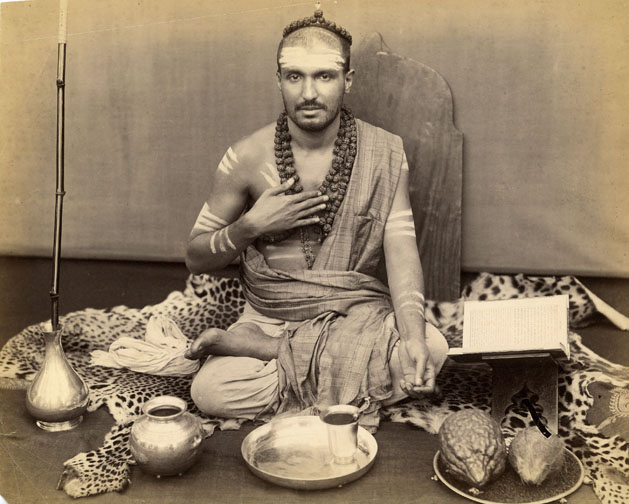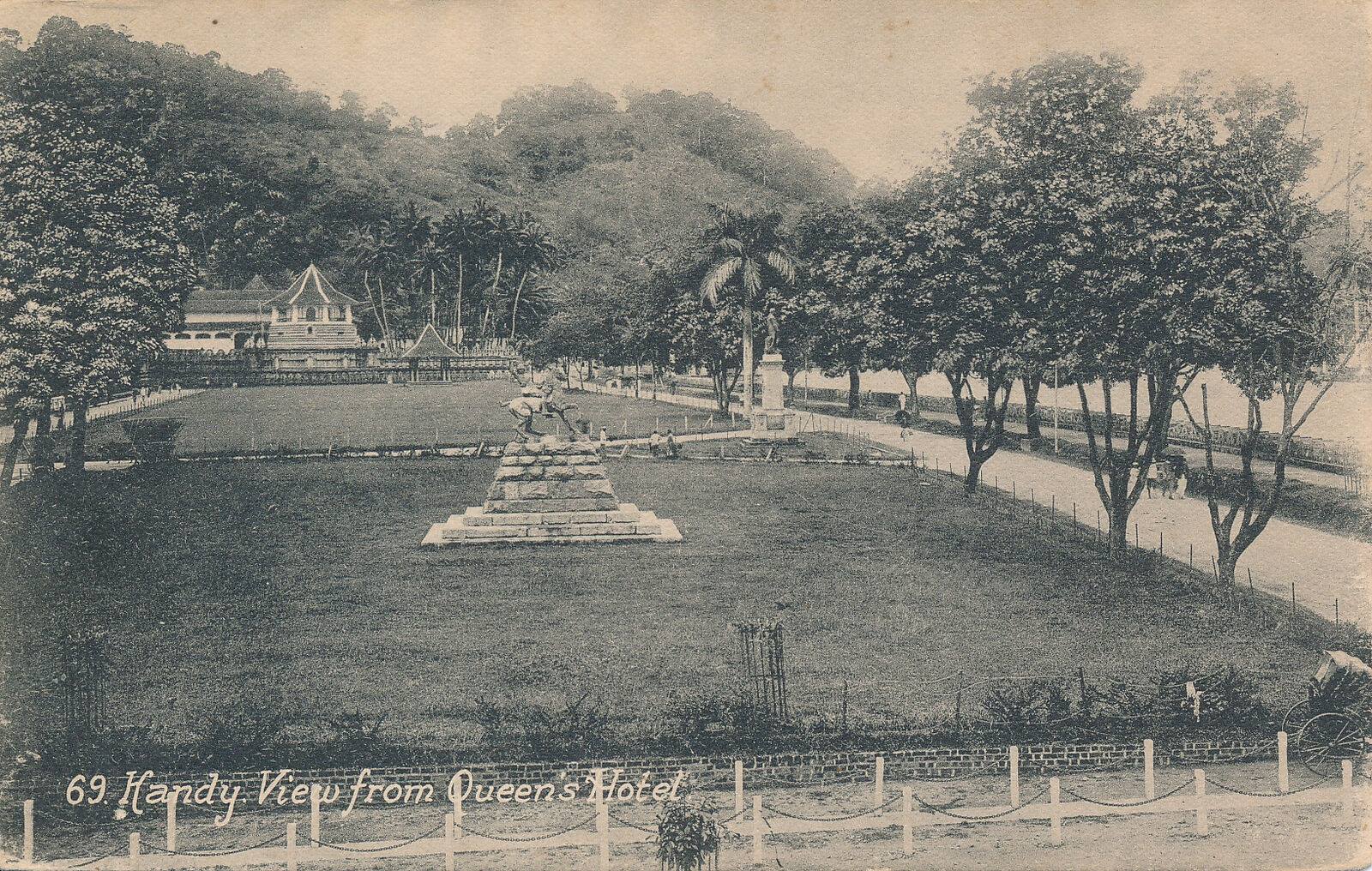The Hindu Priest in the Household
අරුණාචලම්ලගෙ දිහාවෙ තමයි මම කාපු රසම එළවළු ව්යංජන තිබ්බේ. බත් එක්ක විවිධ ආකාරයට පිසූ එළවළු මාළුපිනි හතරක් පහක් කන්න ලැබුණා. මේවත් එක්ක තිබිච්ච පළතුරු වලින් අපේ දහය කණිසමේ උදෑසන ආහාර වේල සකස් වෙලා තිබුණා. හයට හතට වගේ තිබ්ච්ච රෑ කෑමටත් තිබුණේ ඒ වගේම දෙයක්. ඊට අමතරව සමහර දාට සුප් එකක්, අමතර සුළු කෑමක් කන්න ලැබුණා.
 |
| Upper Class Tamil Lady photographed by Plate & Co. [Image Courtesy: www.imagesofceylon.com |
එළවළු ව්යංජන
ඔහුගේ බිරිඳ සමහර වෙලාවට අපිත් එක්ක රෑ කෑමට වාඩි වුණා. මම ඒක සැලකුවේ ගෞරවයක් විදිහට. ඒත් අධ්යාපනයක් ලබාපු උසස් කුලයේ මේ වගේ හින්දු කාන්තාවකට වුණත්, මේ විදිහට නිදහස ලැබුණට, හැම වෙලේම කුඩා කොන්දේසි කීපයක් තියනවා ආගන්තුකයෙක් එක්ක කොහොමද කෑම ගන්නේ කියලා. ඇයට තිබ්බේ බොහොම උපශාන්ත ආචාරසම්පන්න පැවැත්මක්. ඇය ටිකක් දෙගිඩියාවකින් වගේ හිමීට වුණත් ඉතා නිවැරදිව ලස්සනට ඉංග්රීසි බස හැසිරෙව්වා.
 |
| Girl Students in a Classroom of a Galle Missionary School [Image Courtesy: www.imagesofceylon.com ] |
ඉංග්රීසීන් කාන්තාවන්ට ලබා දෙන නිදහස ඇය බොහොම ඉහළින් පැසසුම් කළත්, ඇය කිව්වේ කාන්තාවන් තනිව මහ මඟ යන එකත්, එංගලන්තයෙ කාන්තාවන් ඇය අසා ඇති පරිදි කරන අනෙකුත් දේවල් එක්කත්, ඇගේ සිත එකඟ කරගන්න බැරි බවක්. ඒ කෙසේ වෙතත් ඇය කැමැත්තෙන් හිටියා මේ දේවල් එංගලන්තයටම ඇවිත් සියැසින්ම දැක බලා ගන්න.
 |
| Tamil Girl photographed by Scowen & Co. [Image Courtesy: www.imagesofceylon.com ] |
ඒ දෙන්නගේ දරුවො නම් හරිම දක්ෂයි. ඒ වගේම ඉතා ප්රියමනාපයි. මහේෂ්වරී ලොකු කලු ඇස් ඇති නිශ්චිත මතයක එල්බගෙන සිටින හරිම හුරුබුහුටි පුංචිම පුංචි දැරියක් (වයස අවුරුදු තුනයි).
 |
| Singhalese Ayah photographed by L.A. Beurteaux [Image Courtesy: www.imagesofceylon.com ] |
ඇය කාමරේට ඇවිත් අතක් ඔසවලා, මුහුණ උඩට දික් කරලා සාස්තර කියනවා වගේ දෙමළින් මොනවාද මන්දා බරපතල විදිහට කියවගෙන යනවා.
"තාත්තා හරිම නරකයි, අම්මා එන්න කලින් රෑ කෑමට වාඩි වෙලා." ඊළඟට ඇය ඇගේ ආයම්මාට සිංහලෙන් කතා කරලා මාත් එක්ක ඉංග්රීසියෙන් කතා කළා. මේ භාෂා ඥානය නම් ජීවිතයට මුල පුරන්නෙකුට ඉතාමත් හොඳ දෙයක්.
 |
| Arunachalam Mahadeva in Later Years |
පවුලේ හින්දු පූජකතුමා
අරුණාචලම් මේ නිවසේ කුඩා කාමරයක් පූජා කාමරයක් විදිහට වෙන් කරගෙන තිබ්බා. එච්චර ලොකු දෙයක් නම් ඒ ඇතුළේ තිබ්බේ නැහැ. අයිනේ මේසයක් උඩ තිබිච්ච පහන්තිර පහක ලාම්පුවක්, ඉදිරිපස බිම මල් සහ පලතුරු වගේ දේවල් කිහිපයක් විතරයි තිබ්බේ. ඊළඟ දවසේ බ්රාහ්මණ පූජකතුමා එහි පැමිණ පූජා පවත්වන වෙලාවෙ මමත් එතන හිටියා. ඔහු සංස්කෘත පාඨ කිහිපයක් කටපාඩමෙන් හඬනඟා කියා, කපුරු දල්වා, ගොම අළු සහ සඳුන් ආලේපයක් අපේ නළලේ ගා, උකු කිරි බොන්නට දී හැමෝටම මලක් බැගින් පිරිනැමුවා. ගොම අළු කියන්නේ සංකේතයක්. ගොම පිළිස්සුණාම, පිරිසිදුවෙලා පවිත්රවෙලා තත්වයෙන් ඉහළ යනවා වගේම, අපේ ශරීරයත් ශිවගේ ඉදිරියේදි ගිනි දැල්ලෙන් ඇවිලිලා සුපිරිසිදු වෙනවා යන්න ඉන් අර්ථවත් වෙනවා. අරුණාචලම් කියන විදිහට ඔවුන් ශිවගේ ආලෝකය මූර්තිමත් කරන්න ගිනිදැල්ලේ ආලෝකයත් හිරුගේ ආලෝකයත් භාවිතා කරනවා. ඔවුන් හැම තිස්සෙම වන්දනාව අවසන් කරන්නේ එළියට ගිහින් සුර්යාට නමස්කාර කරලා.
 |
| Hindu Priest photographed by Skeen & Co. [Image Courtesy: www.imagesofceylon.com ] |
මේ බ්රාහ්මණ පූජකතුමා අවුරුදු 40ක විතර පුද්ගලයෙක්. ඔහුත් සමඟ නිතරම වයස අවුරුදු 15ක විතර ප්රියංකර මූණක් සහිත පිරිමි ළමයෙක් හිටියා. පෙනෙන හැටියට නම් විධිමත් අධ්යාපනයක් ලබා නෑ. ඇඳුම් ඇඟලාගෙන හිටියට එතරම්ම ඇඳුමකුත් ඇඳ නෑ. කරට උඩින් දමා ඇති පුන නූලත් මුහුණේ දක්වන සුපරීක්ෂාකාරීබවත් හැරෙන්නට අන් අයට වඩා පැහැදිලිව හඳුනාගත හැකි සුවිශේෂ පාටකුත් නෑ. බ්රහ්මණයන්ගේ මුහුණේ නිශ්චිත සුපරීක්ෂාකාරී බවක් ප්රකාශනය වෙන බව බොහොම ප්රකට කාරණයක්. එනමුත් ප්රශ්නේ වෙන්නේ මේ සුපරීක්ෂාකාරී බව වැඩි වශයෙන් භාවිත වෙන්නේ ලාභ උපයගන්න.
 |
| Hindu Priest photographed by CA & Co. [Image Courtesy: www.imagesofceylon.com ] |
බෞද්ධ හෝ හින්දු වේවා (ලක්දිව බහුතර පැතිර පවත්නා ආගම වෙන්නේ බුද්ධාගමයි) පොදුවේ මෙහි සිටින පූජක උතුමන්ලා මහජනයා සමඟ පවත්වන සම්බන්ධතාවය, ප්රංශයේ ගම්පළාත්වල හෝ අයර්ලන්තයේ ගම්පළාත්වල සිටිනා පූජක උතුමන්ලාට සමානයි. ඒ කියන්නේ, තමන්ට මොන ආධ්යාත්මික බලයක් තියනවා කියලා කියා පෑවත්, කිසිම ලෞකික සැපතක් ආරුඪ කරගන්න යන්නේ නෑ. ඉතින් ඔවුන් හැමදාම දුප්පත්, ඒ වගේම බොහෝ විට ඉතා නූගත්.
 |
| Hindu Anchorite [Image Courtesy: www.imagesofceylon.com ] |
 |
| Hindu Fakir photographed by Plate & Co. [Image Courtesy: www.imagesofceylon.com ] |
බංගලාව
මේ වගේ උණුසුම් තෙත් ගතියක් ඇති දේශගුණයක එක් වාසියක් තියනවා. නම් වශයෙන් කිව්වොත් පොත්, බඩු මුට්ටු, ඇඳුම් පැළඳුම් වගේ දේවල්, ඉක්මනටම දිරාපත් වෙලා විනාශ වෙන නිසාම ඔබේ නිවස එක් එක් දේවල් වලින් පුරවගන්න ඇතිකරවන පෙළඹවීම ඉතාම අඩුයි. සමහර ඉංග්රීසීන් ඇත්තටම උත්සහ කරනවා ඔවුන්ගේ කාමර, බඩු මුට්ටු වලින් පුරවගෙන "බේස්වෝටර්"වල** හිටියා වගේ තවදුරටත් ජීවත් වෙන්න. නමුත් මේ අනුවණ ක්රියාවෙන් ඔවුන් නිතර නිතර සෑහෙන්න හිරිහැර විඳිනවා.
 |
| Harper's Bungalow, Poonagala, Haputale [Image Courtesy: www.imagesofceylon.com ] |
ගෙබිම හදලා තියෙන්නේ සිමෙන්ති කොන්ක්රීට් ජාතියකින්. ඒ හන්දා ලෑලි ගෙබිමකින් නොවැරදීම උඩට එන වේයෝ, සිමෙන්ති පොළවෙන් උඩට එන එක වළකිනවා. ඒ වගේම කකුලටත් හරිම සනීපයක් සිසිලසක් දැනෙනවා. බුමුතුරුණු, බිත්ති රාක්ක සහ අස් නොකරපු දේවල් නම් ඊට අපහසුතාවයක් එක් කරනවා. ලාච්චු සහිත අල්මාරියක් හෝ පොත් රාක්කයක් බිත්තියෙන් අඩියක් දෙකක් මෙහාට වෙන්න තියලා තියනවා. ඒ හන්දා සේවකයන්ට හැමදාම එහි පිටිපස්ස අතු ගාන්න පුළුවන්. ඒ නිසාම බඩගාගෙනයි පැන පැනයි මහා වැස්සෙයි ඊට පස්සෙයි එන කුඩා ගෙම්බන්, කටුස්සන්, ගෝණුස්සන් සහ එවැනි සතුන් ලේසියෙන්ම පලවා හරින්නට පුළුවන්. මකුළුවන්ට නම් ලේසියෙන් අඩියක් තියන්න ඉඩක් ලැබෙන්නෙ නෑ. හානිකර කෘමී සතුන්ට ලොකුම රැකවරණය ලැබෙන්නේ මේ මීයො පිරිච්ච ලොකු වහලෙන්. මේ මීයො අල්ලගන්න බලාපොරොත්තුවෙන්, එච්චරම විසකුරු නැති අඩි පහක් හයක් විතර දිග ගැරඬියෝයි හඳුන් දිවියොයි එනවා. සර්පයන් ඇදෙන සද්දෙ, අසරණ පුංචි මීයන් මොර හඬ දෙන සද්දේ, මේ රෑට ඇහෙන උන්ගේ සද්ද බද්ද මම කියන්න කැමතියි හරිම කරදරයක්.
 |
| Young Ponnambalam Arunachalam (ca. 1875) [Image Courtesy: Hindu Samaj Heritage] |
[අනුවාදක සටහන:
*- පොන්නම්බලම් අරුණාචලම්ගේ පුතුන් සහ දියණියන් අතර මහේෂ්වරී අරුණාචලම් සහ අරුණාචලම් මහාදේවා වේ. ජයන්ත යනු කවුදැයි නිශ්චිත නැත. අරුණාචලම් පත්මනාභ යන නමත් සමඟ "ජයන්ත" යන හුරතල් නාමය බැඳී ඇත.
**- එංගලන්තයේ මධ්යම ලන්ඩනයේ ප්රදේශයක්
]
“ආදම්ගේ ශිඛරය මතින් එලිෆන්ටා ගුහා වෙත – ලක්දිව සහ ඉන්දියාවේ රූප සටහන්” : එඩ්වඩ් කාපෙන්ටර්
තෙවන පරිච්ඡේදය : කුරුණෑගල
From Adam’s Peak To Elephanta : Sketches in Ceylon and India by Edward Carpenter
CHAPTER III: KURUNÉGALA
A. has most lovely vegetable curries ; plenty of boiled rice, with four or five little dishes of different sorts of curried vegetables. This, with fruit, forms our breakfast—at ten ; and dinner at six or seven is much the same, with perhaps an added soup or side dish. His wife sometimes joins us at dinner, which I take as an honor, as even with those Hindu women who are emancipated there is often a little reserve about eating with the foreigner. She has a very composed and gentle manner, and speaks English prettily and correctly, though slowly and with a little hesitation ; approves of a good deal of the English freedom for women, but says she cannot quite reconcile herself to women walking about the streets alone, and other things she hears they do in England. However, she would like to come to England herself and see.
The children are very bright and charming. Maheswari (three years old) is the sweetest little dot, with big black eyes and a very decided opinion about things. She comes into the room and lifts up one arm and turns up her face and prophesies something in solemn tones in Tamil, which turns out to be, "Father Is very naughty to sit down to dinner before mother comes." Then she talks Cinghalese to her nurse and English to me, which is pretty good for a beginner in hfe. Mahadeva and Jayanta, the two boys (seven and nine respectively), are in the bubbling- over stage, and are alternately fast friends and fighting with each other two or three times a day, much like English boys. They are dressed more after the English fashion, though they are privileged to have bare knees and feet—at any rate in the house ; and Jayanta has a pony which he rides out every day.
A. sets apart a little room in this house as a "chapel." It is quite bare, with just a five-wicked lamp on a small table in one corner, and flowers, fruit, etc., on the ground in front. I was present the other day when the Brahman priest was performing a little service there. He recited Sanskrit formulas, burned camphor, and gave us cowdung ashes and sandalwood paste to put on our foreheads, consecrated milk to drink, and a flower each. The cowdung ashes are a symbol. For as cow-dung, when burnt, becomes clean and even purifying in quality, so must the body itself be consumed and purified in the flame of Siva's presence. A. says they use a gesture identifying the light (of Siva) within the body with the light of the flame, and also with that of the sun ; and always terminate their worship by going out into the open and saluting the sun. The Brahman priest, a man about forty, and the boy of fifteen who often accompanies him, are pleasant-faced folk, not apparently at all highly educated, wearing but little in the way of clothes, and not specially distinguishable from other people, except by the sacred thread worn over the shoulder, and a certain alertness of expression which is often noticeable in the Brahman—though the trouble is that it Is generally alertness for gain.
The priests generally here, whether Buddhist or Hindu (and Buddhism is of course the prevailing religion in Ceylon), occupy much the same relation to the people which the priests occupy in the country districts of France or Ireland—that is, whatever spiritual power they claim, they do not arrogate to themselves any worldly supremacy, and are always poor and often quite unlettered. In fact I suppose it Is only In the commercially religious, i.e. Protestant, countries that the absurd anomaly exists of a priesthood which pretends to the service of the Jesus who had not where to lay his head, and which at the same time openly claims to belong to "society" and the well-to-do classes, and would resent any imputation to the contrary. There are indeed many points of resemblance between the religions here — especially Hinduism—and Roman Catholicism: the elaborate ceremonials and services, with processions, incense, lights, ringing of bells, etc. ; the many mendicant orders, the use of beads and rosaries, and begging bowls, the monasteries with their abbots, and so forth.
There is one advantage In a hot damp climate like this ; namely that things—books, furniture, clothes, etc.—soon get destroyed and done with, so that there is little temptation to cumber up your house with possessions. Some English of course try to furnish and keep their rooms as if they were still living in Bayswater, but they are plentifully plagued for their folly. The floors here are of some cement or concrete material, which prevents the white ants surging up through them, as they infallibly would through boards, and which is nice and cool to the feet ; carpets, cupboards, and all collections of unremoved things are discountenanced. A chest of drawers or a bookcase stands out a foot or tw^o from the wall, so that the servants can sweep behind it every day. Little frogs, lizards, scorpions, and other fry, which come hopping and creeping in during or after heavy rain can then be gently admonished to depart, and spiders do not find it easy to establish a footing. The greatest harbor for vermin is the big roof, which is full of rats. In pursuit of these come the rat-snakes, fellows five or six feet long, but not venomous, and wild cats ; and the noises at night from them, the shuffling of the snakes, and the squeals of the poor little rats, etc., I confess are trying.
ලක්දිව ගමන් සටහන් පිටු අංක: 25




Comments
Post a Comment